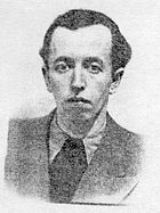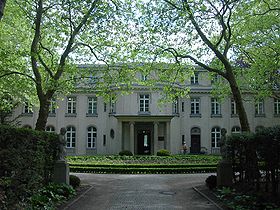
Joseph Wulf
Encyclopedia
Joseph Wulf was a German-Polish-Jewish historian and Holocaust survivor.
. There Joseph Wulf joined a Jewish group of resistance fighters. He was brought in 1941 to Auschwitz Concentration Camp
, which he survived after fleeing one of the notorious death marches. He found his wife and son miraculously still alive, but the Germans had murdered his father, mother, brother, sister-in-law, and niece.
In 1952 Wulf moved to Berlin and was one of the first to inform the citizens of the German Federal Republic of the crimes of the Nazis and the Holocaust. Wulf published many books about the Third Reich, among them biographies of Heinrich Himmler
and Martin Bormann
.
 In 1965 Wulf tried to create a Holocaust memorial and document center in the house where the Wannsee Conference
In 1965 Wulf tried to create a Holocaust memorial and document center in the house where the Wannsee Conference
had been held. On January 20, 1942, at the Wannsee Conference, Reinhard Heydrich
announced Hitler's decision to murder the Jews of Europe. However, the Senate of Berlin
refused to support Wulf’s project.
Wulf was honored with the Leo Baeck Prize (1961), the Carl von Ossietzky Medal (1964) and an honorary doctorate from the Free University of Berlin. But he never had an academic appointment because historians of the Third Reich considered him an outsider. Other historians attributed his interest in the Third Reich to the fact that he had been a victim. Only after Wulf’s death did the general public and academic researchers come to appreciate his work, and it is still often cited. Deeply despondent over the death of his wife and the collapse of his plans for a document center, Wulf committed suicide, age 61, by jumping from the fifth floor window of his Berlin apartment, Giesebrechtstraße 12, Charlottenburg. In his last letter to his son David, 2 August 1974, he had written, "I have published 18 books about the Third Reich and they have had no effect. You can document everything to death for the Germans. There is a democratic regime in Bonn. Yet the mass murderers walk around free, live in their little houses, and grow flowers." In 1992 the Wannsee House became a holocaust memorial. The Joseph Wulf Bibliothek/Mediothek on the second floor holds thousands of books on Nazism, anti-Semitism, and the Jewish genocide, along with many videos, microfilm texts, and original Nazi era documents. Wulf’s last letter is on display in Berlin’s Jewish Museum.
Early life
A child of a Jewish family originating in Poland, Wulf was educated in Krakow. At the Jewish university there he was trained as a Rabbi. After the German occupation of Poland in the Second World War the Wulf family was deported to the Krakow GhettoKraków Ghetto
The Kraków Ghetto was one of five major, metropolitan Jewish ghettos created by Nazi Germany in the General Government territory for the purpose of persecution, terror, and exploitation of Polish Jews during the German occupation of Poland in World War II...
. There Joseph Wulf joined a Jewish group of resistance fighters. He was brought in 1941 to Auschwitz Concentration Camp
Auschwitz concentration camp
Concentration camp Auschwitz was a network of Nazi concentration and extermination camps built and operated by the Third Reich in Polish areas annexed by Nazi Germany during World War II...
, which he survived after fleeing one of the notorious death marches. He found his wife and son miraculously still alive, but the Germans had murdered his father, mother, brother, sister-in-law, and niece.
Postwar Historian
At war’s end Wulf remained in Poland, and was from 1945 to 1947 executive member of the Central Jewish Historical Commission. In the summer of 1947 he moved to Paris and formed the Centre pour l'Histoire des Juifs Polonais.In 1952 Wulf moved to Berlin and was one of the first to inform the citizens of the German Federal Republic of the crimes of the Nazis and the Holocaust. Wulf published many books about the Third Reich, among them biographies of Heinrich Himmler
Heinrich Himmler
Heinrich Luitpold Himmler was Reichsführer of the SS, a military commander, and a leading member of the Nazi Party. As Chief of the German Police and the Minister of the Interior from 1943, Himmler oversaw all internal and external police and security forces, including the Gestapo...
and Martin Bormann
Martin Bormann
Martin Ludwig Bormann was a prominent Nazi official. He became head of the Party Chancellery and private secretary to Adolf Hitler...
.
Wannsee Memorial

Wannsee Conference
The Wannsee Conference was a meeting of senior officials of the Nazi German regime, held in the Berlin suburb of Wannsee on 20 January 1942. The purpose of the conference was to inform administrative leaders of Departments responsible for various policies relating to Jews, that Reinhard Heydrich...
had been held. On January 20, 1942, at the Wannsee Conference, Reinhard Heydrich
Reinhard Heydrich
Reinhard Tristan Eugen Heydrich , also known as The Hangman, was a high-ranking German Nazi official.He was SS-Obergruppenführer and General der Polizei, chief of the Reich Main Security Office and Stellvertretender Reichsprotektor of Bohemia and Moravia...
announced Hitler's decision to murder the Jews of Europe. However, the Senate of Berlin
Senate of Berlin
The Senate of Berlin is the executive body governing the city of Berlin, which at the same time is a state of Germany. According to the Constitution of Berlin the Senate consists of the Governing Mayor of Berlin and up to eight Senators appointed by the Governing Mayor, two of whom are appointed ...
refused to support Wulf’s project.
Wulf was honored with the Leo Baeck Prize (1961), the Carl von Ossietzky Medal (1964) and an honorary doctorate from the Free University of Berlin. But he never had an academic appointment because historians of the Third Reich considered him an outsider. Other historians attributed his interest in the Third Reich to the fact that he had been a victim. Only after Wulf’s death did the general public and academic researchers come to appreciate his work, and it is still often cited. Deeply despondent over the death of his wife and the collapse of his plans for a document center, Wulf committed suicide, age 61, by jumping from the fifth floor window of his Berlin apartment, Giesebrechtstraße 12, Charlottenburg. In his last letter to his son David, 2 August 1974, he had written, "I have published 18 books about the Third Reich and they have had no effect. You can document everything to death for the Germans. There is a democratic regime in Bonn. Yet the mass murderers walk around free, live in their little houses, and grow flowers." In 1992 the Wannsee House became a holocaust memorial. The Joseph Wulf Bibliothek/Mediothek on the second floor holds thousands of books on Nazism, anti-Semitism, and the Jewish genocide, along with many videos, microfilm texts, and original Nazi era documents. Wulf’s last letter is on display in Berlin’s Jewish Museum.
Joseph Wulf's Books
- Das Dritte Reich und die Juden, Berlin 1955 (together with Léon PoliakovLeon PoliakovLéon Poliakov was a French historian who wrote extensively on the Holocaust and anti-Semitism.Born into a Russian Jewish family, Poliakov lived in Italy and Germany until he settled in France....
) - Das Dritte Reich und seine Diener, Berlin 1956 (with Poliakov)
- Das Dritte Reich und seine Denker, Berlin 1959 (with Poliakov)
- Die Nürnberger Gesetze, Berlin 1960
- Heinrich HimmlerHeinrich HimmlerHeinrich Luitpold Himmler was Reichsführer of the SS, a military commander, and a leading member of the Nazi Party. As Chief of the German Police and the Minister of the Interior from 1943, Himmler oversaw all internal and external police and security forces, including the Gestapo...
, Berlin 1960 - Das Dritte Reich und seine Vollstrecker - Die Liquidation von 500.000 Juden im Ghetto Warschau, Berlin 1961.
- Martin BormannMartin BormannMartin Ludwig Bormann was a prominent Nazi official. He became head of the Party Chancellery and private secretary to Adolf Hitler...
- Hitlers Schatten, Gütersloh 1962 - Aus dem Lexikon der Mörder, Gütersloh 1963
- Musik im Dritten Reich, Gütersloh 1963
- Die bildenden Künste im Dritten Reich, Gütersloh 1963
- Literatur und Dichtung im Dritten Reich, Gütersloh 1963
- Theater und Film im Dritten Reich, Gütersloh 1963
- Presse und Funk im Dritten Reich, Gütersloh 1964
- Raoul WallenbergRaoul WallenbergRaoul Wallenberg was a Swedish businessman, diplomat and humanitarian. He is widely celebrated for his successful efforts to rescue thousands of Jews in Nazi-occupied Hungary from the Holocaust, during the later stages of World War II...
: Il fut leur espérance, Paris 1968 (first published Colloquium Verlag, Berlin 1958).

